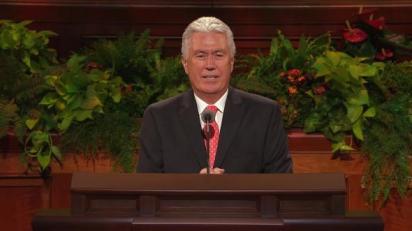
Dieter F. Uchtdorf Second Counselor in the First Presidency
“[Marriages are] the order of heaven. They are an echo of celestial pattern and an emulation of God’s eternal family.” –
This session prompted in me the desire to consider what appears, after much review, to be a major foundational distinction between the basic theological underpinnings in classical Christian beliefs and those of Mormonism. It was my original intention to provide a “blow-by-blow” synopsis of the “General Priesthood Session” of this year’s Spring General Conference of the Church of Jesus Christ of Latter-day Saints. However, a central concept kept creeping to the foreground of the discussions which, to my understanding, so clearly illustrated why these belief systems remain separate and why many Evangelicals and Catholics do not consider Mormonism to be, in fact, Christian.
Before I ever learned a single fact about Mormon teachings or the unique Mormon scriptures (Book of Mormon, Doctrine and Covenants, and Pearl of Great Price) I had been exposed to the importance of families in the LDS (short for Latter-day Saint) worldview. As many can likely relate, I remember viewing commercials for the church sometime in my childhood which portrayed a wholesome and integrated family system as a primary sales pitch.
This portrayal has proved more than tempting for many who have eventually joined the church. In the LDS visitor’s centre in Independence, Missouri stands a large display, complete with video, in which the viewer is introduced to this important LDS tenant, “families are forever.” This is a common phrase used by members in the church and is the first place to start in understanding the LDS gospel.
This statement flows from the LDS conception of the “pre-existence” and its derived teachings about God and man. Those not in the church may notice some major discrepancies from what they learned in the Bible or at church. The LDS church manual, Achieving a Celestial Marriage, explains the church’s basic anthropology and cosmology thus:
The gospel of Jesus Christ teaches that man is an eternal being made in the image and likeness of God. It also holds that man is a literal child of God and has the potential, if faithful to divine laws and ordinances of becoming like his heavenly parent. God is an exalted man who once lived on an earth and underwent experiences of mortality. The prophet Joseph Smith refers to this as ‘the great secret.’
It goes on to explain why the church believes in eternal families:
By definition exaltation includes the ability to procreate the family unit throughout eternity. This, our Father in heaven has power to do. His marriage partner is our mother in heaven. We are their spirit children, born to them in the bonds of celestial marriage. The Lord would have all his children attain exaltation, but men must have their agency. Only those who subscribe by ordinance and by faithful adherence to covenant are worthy of ‘a continuation of the seeds forever and ever.’ (D&C 132:19)
Without understanding this basic foundation it becomes easy to speak passed one another with regard to basic Christian terms. It is easy to take for granted that “the sense or meaning of a word is not its referent but the mental context with which that word is associated.” Words only have meaning in their respective contexts and only in the sense meant by the author or speaker. Good interpreters must ensure they have the correct understanding.
BYU professor Robert Millet illustrates the crucial nature of this endeavour when he says regarding the term “salvation” that, “Here as in other theological matters, we use the same or similar words as our Christian neighbours to describe a Christian concept but discover upon more serious investigation that what we mean is at least slightly different.”
 It may come as a surprise to lifelong Latter-day Saints to learn that many Protestant Evangelicals listen to a message from an LDS church authority and to share surprise at how little the speaker spoke of Jesus. In this particular session the observation was apropos. Only in Young Men’s President, Stephen Owen, was Jesus truly featured in the teaching. Christ only was used to say the church’s name or to talk about how Mormons need to make themselves worthy to be with Jesus.
It may come as a surprise to lifelong Latter-day Saints to learn that many Protestant Evangelicals listen to a message from an LDS church authority and to share surprise at how little the speaker spoke of Jesus. In this particular session the observation was apropos. Only in Young Men’s President, Stephen Owen, was Jesus truly featured in the teaching. Christ only was used to say the church’s name or to talk about how Mormons need to make themselves worthy to be with Jesus.
To Christians, this completely misses the point of his atonement altogether. To add anything to Christ’s finished work, whether it be our own works, our families, or anything else good, bad, or otherwise, completely diminishes and in fact remakes Christianity into a distorted, disfigured shadow of itself. In quoting Swiss theologian Emil Brunner, John Stott writes, “Faith in the mediator—in the event which took place once for all, a revealed atonement—is the Christian religion itself; it is the ‘main point;’ it is not something alongside of the centre; it is the substance and kernel, not the husk.”
In contradiction to this we hear repeated statements from First Counselor Henry Eyring which reveal a viewpoint in which the family, temple ordinances, and the Melchizedek Priesthood, and a preoccupation with personal worthiness, rivals and possibly even eclipses the Savior himself. The viewer is informed by Counselor Eyring that everything the Latter-day Saint does “should have celestial marriage as its focus and purpose.”
Every priesthood holder’s obligation, he continues, is to put our families at the center of our concern and to be concerned with other families. This is the most important concern and what we need to “qualify” for life with Heavenly Father and with Jesus. Every major decision must concern itself with how to craft eternal families. In fact, this is the greatest of the gifts of God. He states, “There is no more important commitment in time or eternity than marriage.”
 Marriage is a wonderful gift of God. Is it truly his “greatest” gift? Does Jesus teach his followers the importance of eternal families and to keep them at the centre of their concern and that there is no more important commitment or does he teach something else? Here, in this one topic we find a remarkable “Rosetta stone” opportunity to discover if the LDS general authorities are speaking the language of heaven.
Marriage is a wonderful gift of God. Is it truly his “greatest” gift? Does Jesus teach his followers the importance of eternal families and to keep them at the centre of their concern and that there is no more important commitment or does he teach something else? Here, in this one topic we find a remarkable “Rosetta stone” opportunity to discover if the LDS general authorities are speaking the language of heaven.
The evidence, in comparison to what we have just discussed, is overpowering in its opposition to the high, overemphasized importance placed upon the family unit. Clearly, God designed and upholds marriage as an important bedrock institution for society. Jesus confirmed this in Matthew 19
when he cited the Torah and stated that a man should leave his father and mother and be united to his wife. What, however does the New Testament say is the purpose of such a union in eternity? Paul instructs the believing husbands to love their wives just as Christ loved the church. This mystery of marriage is said in Ephesians 5:32 to refer to Christ and the church. If marriages are eternal and at the centre of the Gospel, why then does Paul say in 1 Corinthians 7 that it is good for a man to not marry and that in the present circumstance (whatever that may be) it is advantageous to remain single?
These questions are further compounded when we consider the words of Jesus. He, when given the opportunity, continued to teach that the kingdom of God far outweighed marriage in importance and taught a Gospel which did not seem to include marriages as the key to eternal life. Consider first that in Matthew 10:34-36 that Jesus himself would divide a family and would not send peace but a sword.
In verse 37 Jesus states, “He that loveth father or mother more than me is not worthy of me: and he that loveth son or daughter more than me is not worthy of me.” Does it sound as though Jesus has a higher priority to place above marriages? This is exacerbated in other places in the Gospels.
In Luke 14:26 Jesus says,
“If any man come to me, and hate not his father, and mother, and wife, and children, and brethren, and sisters, yea, and his own life also, he cannot be my disciple.” In another place, when Jesus’ earthly family comes looking for him we learn this, “Who is my mother? and who are my brethren? And he stretched forth his hand toward his disciples, and said, Behold my mother and my brethren! For whosoever shall do the will of my Father which is in heaven, the same is my brother, and sister, and mother.”
Many have read these texts and surmised that Jesus is not in actuality teaching the hatred of families in this text. He instead is teaching the preeminence of the Kingdom of God, and therefore himself, to all other loves. Mark Strauss comments, “Jesus sets out the extraordinarily high cost of discipleship. Commitments to him must far exceed devotion to family or to self. In light of such demands everyone should weigh the cost carefully before making such a commitment.”
These texts are making the likelihood that God believes in eternal families look quite tenuous but Jesus deals with marriage in his eternal kingdom in the Gospels. The context involves a group of Sadducees which come to attempt a covert operation in order to catch Jesus in a quandary. The religious leaders craft a scenario that they are sure will catch Jesus in a no win position. There is a woman with terrible luck in love who marries seven men, all of whom died. The question is then posed, “In the resurrection, whose wife shall she be of the seven?”
One might suspect that Jesus would answer this question thus,
“Verily I say unto you, if a man marry a wife by my word, which is my law, and by the new and everlasting covenant and it is sealed unto them by the Holy Spirit of promise, by him who is anointed, unto whom I have appointed the keys of the priesthood; and it shall be said unto them—Ye shall come forth in the first resurrection; and if it be after the first resurrection and shall inherit thrones, kingdoms, principalities and powers, dominions, all heights and the depth—then shall it be written in the lamb’s book of life. Which glory shall be a fullness and continuation of seeds forever and ever. Then shall they be gods, because they have no end; therefore shall they be from everlasting to everlasting because they continue.”
However, Jesus responded to their questioning quite differently then what the LDS scriptures would have him respond.
“Jesus answered and said unto them, Ye do err, not knowing the scriptures, nor the power of God. For in the resurrection they neither marry, nor are given in marriage, but are as the angels of God in heaven” (Matthew 22:29-30).
Notice, after the resurrection these are neither married neither are they given in marriage. Remember the question, whose wife will she be. According to the eternal order of heaven, she should be the first man’s wife in the afterlife. Jesus does not say this. Instead he teaches that she will not be anyone’s wife because in the resurrection they shall be like the angels which are neither married nor given to marrying.
I’ve recently been reading a book on marriage from a Christian perspective by popular author Francis Chan and his wife Lisa. I came across a striking portrayal of marriage in its appropriate eternal setting they state:
When we consider the biblical storyline as a whole, our over-prioritization of our human relationships looks absurd. The Bible begins with a being so powerful that his words command non-existent things to exist, and they obey. It presents to us a being so holy and just that he once drowned every person on earth, sparing only the eight people who still looked to him. And the Bible concludes with visions of a terrifying future judgment, where every person is cast eternally into either a place of perfect pleasure in union with God or a place of ultimate pain apart from him. God takes center stage in every story of Scripture. He is the creator of life, the judge, and the savior. So while the Bible does talk about marriage, there is a much, much bigger picture.
This is the worldview of the Bible. The same book which has Jesus teaching that anyone who loves father and mother more than him is not worthy of him and who teaches that in the resurrection we shall be like angels which do not marry. The Church of Jesus Christ of Latter-day Saints, on the other hand, teaches routinely and portrays families as the centre of God’s program. Biblically, this could not be further from the truth. Jesus wants you to be free of human tradition and to experience what a girl named Katie once learned when she realized that the religion of Mormonism did not match up with the teachings of the Bible:
“She found that the religion she had followed had fooled her into believing that she needed church leaders, a bishop, a stake president, apostles, priesthood, and a prophet between her Lord and herself. It was all a lie. But Jesus sought her out to free her. Once her eyes were opened to see that Jesus alone was enough, then Jesus alone became all she wanted—and he was better than anything she thought she already had.”
References
1 Church Educational System, Achieving a Celestial Marriage: Student Manual (Salt Lake City: Corporation of the President of the Church of Jesus Christ of Latter-day Saints, 1976), pp. 129
2 Ibid.
3 D.A. Carson, Exegetical Fallacies (Grand Rapids: Baker, 1993), pp. 63
4 Robert L. Millet, A Different Jesus: The Christ of the Latter-day Saint (Grand Rapids: Eerdmans, 2005), pp. 81
5 John R. W. Stott, The Cross of Christ (Downers Grove: IVP, 2006), pp. 48
6 Mark Strauss, “Luke” in Zondervan Illustrated Bible Backgrounds Commentary, vol. 1 (Grand Rapids: Zondervan, 2002), pp. 444
7 Doctrine and Covenants 132:19-20
8 Francis and Lisa Chan, You and Me Forever: Marriage in Light of Eternity (San Francisco: Claire Love, 2014), pp. 38
9 Lynn K. Wilder, Unveiling Grace (Grand Rapids: Zondervan, 2013), pp. 252








Yes, from beginning to end it’s all about Jesus.